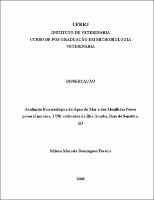Please use this identifier to cite or link to this item:
https://rima110.im.ufrrj.br:8080/jspui/handle/20.500.14407/15622| metadata.dc.type: | Dissertação |
| Title: | Avaliação Bacteriológica da Água do Mar e dos Mexilhões Perna perna (Linnaeus, 1758) cultivados na Ilha Guaíba, Baía de Sepetiba, RJ |
| Other Titles: | Bacteriological monitoring of seawater and Perna perna mussels (Linnaeus, 1758) cultivated in Ilha Guaíba, Baía de Sepetiba, RJ |
| metadata.dc.creator: | Pereira, Milena Marcela Domingues |
| metadata.dc.contributor.advisor1: | Silva, Pedro Paulo de Oliveira |
| metadata.dc.contributor.referee1: | Lutterbach, Márcia Teresa Soares |
| metadata.dc.contributor.referee2: | Lázaro, Norma dos Santos |
| metadata.dc.description.resumo: | The intensive use of Ilha Guaíba’s surrounding water for aquaculture has increased the demand for monitoring analyses to indicate the bacteriological environmental quality. In a year-long study developed from April 2007 to March 2008, total and fecal coliform concentrations present in superficial waters used for shellfish farming were determined by the Most Probable Number (MPN) technique. As well as that the screening for the presence of Salmonella and Staphylococcus positive coagulase which was also carried out. Total coliform values ranged from <1,80 a 9,43 x 10 NMP.100mL-1 and thermotolerant ones varied from < 1,8 e 2,71 x 10 NMP.100mL-1. Neither Salmonella nor Staphylococcus positive coagulase from shellfish growing water samples was isolated. The environmental factors, as superficial water temperature and salinity, rainfall and sunlight levels, Secchi profundity, were also measured. Annual averages for these factors were 23,1°C, 35,2, 5,1mm, 22,91W/m2 and 2,4m, respectively. Results have indicated an excellent bacteriological quality, proving that Ilha Guaíba’s water is in accordance with the Brazilian standards for shellfish growing areas. The main abiotic factor correlated with water contamination is rainfall followed by salinity |
| Abstract: | Aquaculture has been developing in Brazil as much as worldwide, representing an alternative to extractive harvesting. Mangaratiba is a municipal district of Rio de Janeiro that offers the ideal conditions to the implementation of shellfish farming in the state. In this context, the present dissertation has been designed to evaluate microbial situation of the shellfish growing waters as well as of the brown Perna perna mussels from marine farm located in Ilha Guaíba, municipal district of Mangaratiba. Bacteriological monitoring was carried out from April 2007 to March 2008 to verify and quantify the presence of total and fecal coliforms, Salmonella spp., Staphycoccus positive coagulase and correlate fortuitous fluctuations in the microbial levels with environmental factors such as temperature, salinity, Secchi profundity, sunlight global radiation and rainfall. In seawater samples total coliform values ranged from <1,80 a 9,43 x 10 NMP.100mL-1 and thermotolerant ones varied from < 1,8 e 2,71 x 10 NMP.100mL-1. Total and thermotolerant coliform concentrations in mussel tissue varied from <0,18 a 1,61 x 102 NMP.g-1 and <0,18 a 3,57 x 10 NMP.g-1, respectively. Neither Salmonella nor Staphylococcus positive coagulase was detected from samples of seawater and mussels. Results have indicated that the bacteriological quality of shellfisheries’ waters in Ilha Guaíba and of mussels cultivated in there has been in accordance with the Brazilian standards. The annual averages for the environmental factors as superficial water temperature and salinity, rainfall and sunlight levels, Secchi profundity were 23,1°C, 35,2, 5,1mm, 22,91W/m2 and 2,4m, respectively. It has been found that the factor which presents the highest correlation with coliform contamination is rainfall followed by salinity |
| Keywords: | Aqüicultura Moluscos bivalves Análises bacteriológicas Aquaculture Shellfish Bacteriological monitoring |
| metadata.dc.subject.cnpq: | Medicina Veterinária |
| metadata.dc.language: | por |
| metadata.dc.publisher.country: | Brasil |
| Publisher: | Universidade Federal Rural do Rio de Janeiro |
| metadata.dc.publisher.initials: | UFRRJ |
| metadata.dc.publisher.department: | Instituto de Veterinária |
| metadata.dc.publisher.program: | Programa de Pós-Graduação em Medicina Veterinária (Patologia e Ciências Clínicas) |
| Citation: | Pereira, Milena Marcela Domingues. Avaliação Bacteriológica da Água do Mar e dos Mexilhões Perna perna (Linnaeus, 1758) cultivados na Ilha Guaíba, Baía de Sepetiba, RJ. 2008. 118 f. Dissertação (Programa de Pós-Graduação em Medicina Veterinária (Patologia e Ciências Clínicas)) - Universidade Federal Rural do Rio de Janeiro, Seropédica-RJ . |
| metadata.dc.rights: | Acesso Aberto |
| URI: | https://rima.ufrrj.br/jspui/handle/20.500.14407/15622 |
| Issue Date: | 25-Sep-2008 |
| Appears in Collections: | Mestrado em Microbiologia Veterinária |
Se for cadastrado no RIMA, poderá receber informações por email.
Se ainda não tem uma conta, cadastre-se aqui!
Files in This Item:
| File | Description | Size | Format | |
|---|---|---|---|---|
| 2008 - Milena Marcela Domingues Pereira.pdf | Milena Marcela Domingues Pereira | 951.7 kB | Adobe PDF |  View/Open |
Items in DSpace are protected by copyright, with all rights reserved, unless otherwise indicated.

